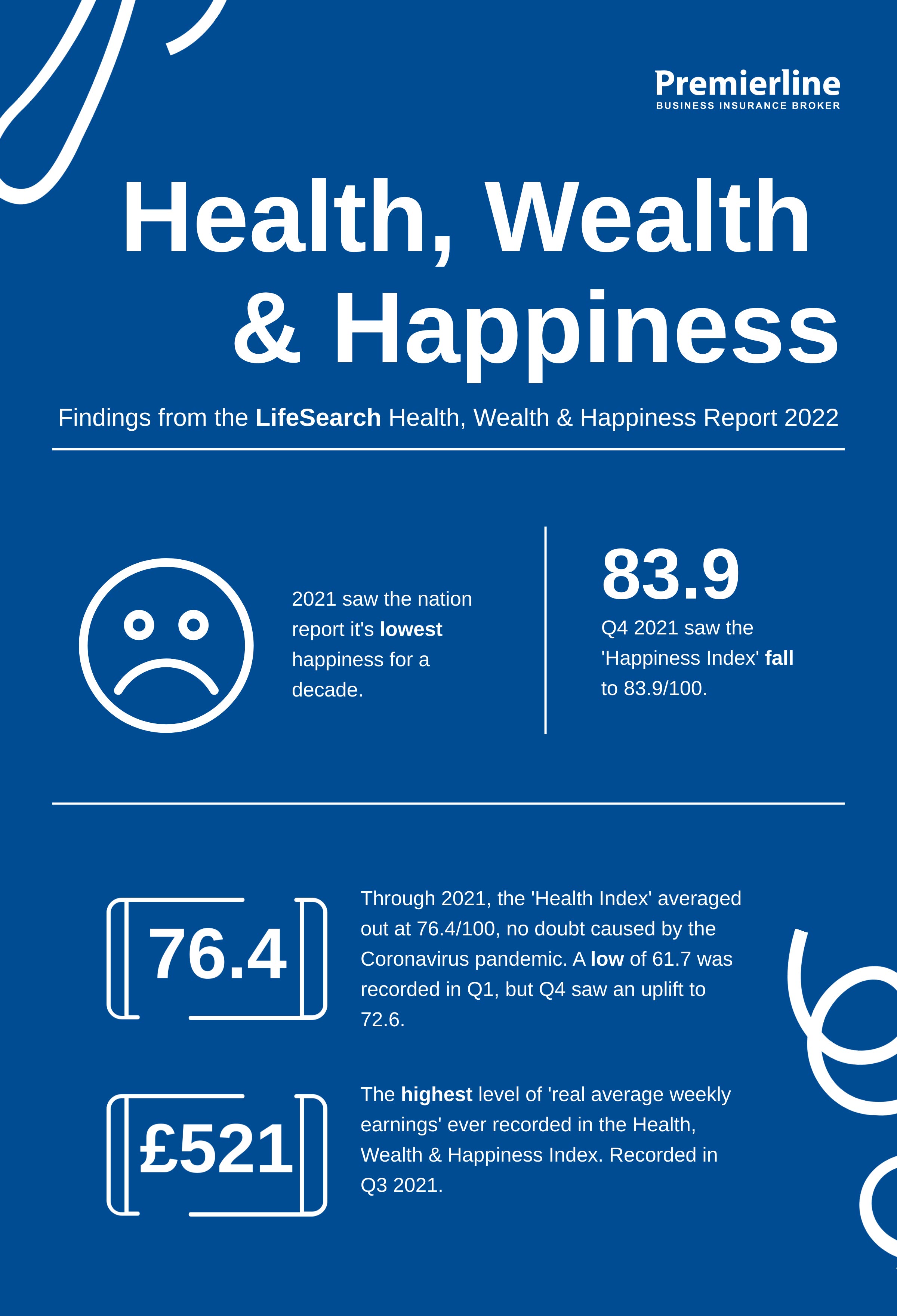Findings from the LifeSearch 2022 Health, Wealth & Happiness Report
Download the findings from the LifeSearch 2022 Health, Wealth & Happiness Report as an infographic

The research, commissioned by Opinium Research uses two sample groups of 2,000 UK adults selected to be nationally representative. The groups provided data at two points across the year, one in January 2022 and the second in April 2022. This data, combined with data from the Office of National Statistics, NHS Digital, YouGov and the Centre for Economics and Business Research was then used to inform the LifeSearch research and create the final report.
You can access the full LifeSearch report for yourself here.
In this post, we’ll be exploring some of the standout trends from the report and will be taking a closer look into some of its findings in order to help our readers understand how the events and experiences of 2022 have shaped the nations feelings, emotions and finances. From a business perspective, these factors can influence customer buying behaviour and therefore it’s important to consider this research when writing business plans for the future, as the way customers feel today will almost certainly impact how they interact with businesses tomorrow.
A bleak start to the new year
In 2021, we saw the nation report its lowest happiness for a decade. The ‘happiness index’ according to LifeSearch fell to 83.9/100 in the final quarter of 2021, bringing us into the new year feeling unhappy and frustrated with the events of the previous 12 months.
Feelings of happiness had been battered down by Covid-19 lockdowns and other social restrictions which meant for many, 2021 was full of disruption – our everyday routines fell apart and since 2020, the new normal had really taken hold and changed our lives for the worse.
The reported ‘health index’ did climb slightly as we entered 2022. The reported average for 2021 was 76.4/100, moving up from a low of 61.7 in the first quarter of 2021, to 72.6 in the final quarter. It’s clear that through the end of 2020 and into 2021, Covid-19 was still having an impact on our overall health, be that directly or indirectly.
Some good news to bring into the new year, through 2021 the data shows the highest level of ‘real average weekly earnings’ was recorded, hitting £521 in the third quarter of 2021. This meant that in 2021, on average people would be earning more money per week, possibly down to government support provided to people in the wake of the Covid-19 lockdowns, and changes in spending habits due to the lockdowns.
Did things get any better?
As we transitioned from 2021 and into 2022, any feelings of positivity were soon lost to more incursions to our way of life. Just as we managed to get over what seemed to be a devastating 2021, war broke out in Europe and the cost of living started to skyrocket, wiping out any potential financial gains that people made during the previous year.
As a result, 34% of people predicted they would struggle to afford the cost of living for the coming 12-months. 16% of people would only manage to pay their minimum payment on their credit card bill each month and 3% of people struggled to afford even that.
The price for a litre of petrol hit a record high of £1.91 in July 2022 whilst diesel peaked at £1.99 per litre. Inflation reached beyond 10% and as a result, it would be predicted that the poorest families would end up £850 worse off throughout the year as a result of rising energy prices.
The invasion of Ukraine has had a major impact on the cost of fuel which in turn affected everything from production and logistics to wholesale prices and ultimately the retail prices of everyday goods. Suddenly everything started to cost over 10% more than it did the previous year, and without wages matching that increase, many of us ended up financially worse off in 2022.
How has the cost-of-living crisis impacted us?
It’s clear to see how the cost-of-living crisis has impacted us financially, but we should also consider the wider effects of rising costs. Financial wellbeing can directly impact our physical and mental health, be that through a change in the affordability of healthy foods or services like gyms, or through the stress that increasing bills can put onto us. Indeed, it seems through the 2022 Health, Wealth & Happiness Report that our mental and physical health has taken a hit alongside our bank accounts and it’s having a very negative impact.
35% of people believe their mental health is now worse than before the pandemic as a result of the cost-of-living crisis. 49% of people reported that they feel they have less money in 2022, despite making financial gains the previous year.
Some additional data starts to help us understand a bit more about what people really worried about during 2022; namely the NHS and their long-term personal health.
The findings show that 15% of people reported that they believe there is a declining trust in the NHS, most likely as a result of the impact of the Covid-19 pandemic. In addition to this, 34% of the UK labour force reported that they now suffer from a long-term health condition. 15% of people also reported that they consumed more alcohol in 2022 than in the previous year.
A struggling NHS, more people suffering long term health conditions and more people turning to vices like alcohol and drugs can only contribute to this cycle – poorer health means more pressure on the NHS and more pressure on the NHS means poorer health.
The wider effects of the attack of Ukraine
It would be amiss to not mention the attack of Ukraine at this point, which has ultimately had a major influence on the cost-of-living crisis. Energy costs, namely the cost of crude oil and natural gas have risen as a result of sanctions placed against Russia and Russian businesses. Also, prior to this, Ukraine was a major hub for the processing and production of raw materials. As production in Ukraine was forced to stop, supply chains have been impacted and this has shifted the supply and demand dynamic, further pushing up the costs of even the most basic goods. This isn’t just a UK problem; it’s having an impact worldwide.
In the UK, people are feeling both the financial and emotional impacts of this. The 2022 Health, Wealth & Happiness Report shows that feelings of stress, sadness, fear and apathy have spiked. The report finds there’s been a 7% increase in general stress levels since the start of the war.
It’s also reported that sadness levels have increased by 12%, doubling the sadness levels which were reported during the first Covid-19 lockdowns in 2020. The report shows that fear levels have increased too, by 13%, with over 20% of those in the sample groups reporting that they are scared by military aggression and the potential consequences of it.
Food prices through 2022 spiked by 13%, leaving us all with less disposable income and a need to focus our spending on buying only essentials. As this continues, the World Bank calculates that global food prices could continue to rise by as much as 37% as production costs continue to increase.
By the 1st of January 2023, the military aggression in Ukraine had been fought for 311 consecutive days. At the time of writing this post, the war continues.
Running a business in 2023
Running your own business can be scary at the best of times, but combining this with global turmoil, and financial uncertainty it can make for a very frightening experience. Business owners more than ever need to be taking steps now to look after their business and their employees to get them through these troubling times.
Getting your business insurance right is crucial in times like these because should the worst happen, you need to ensure you’re covered and financially able to take the hit. When the purse strings are tightened, businesses may look to cut costs by amending their business insurance covers but please remember that this could lead to underinsurance – in a worst-case scenario this could leave your business out of pocket if a claim needs to be made, and by out of pocket, we don’t mean a couple of quid, underinsurance could mean risking your entire business and in turn your livelihood.
At Premierline we work with our customers to ensure their businesses have the right cover to protect them from the risks they face every day. In a world of financial uncertainty, these risks are ever changing which is why we always ensure our customers get the best level of protection for their money. An advised broker can discuss what covers you need and can work directly with insurers to make sure you’ve got everything you need to stay protected in a world of evolving risk.
If you have any questions about your business insurance during the cost-of-living crisis, contact our team of insurance brokers who can provide you with an advised service and find you the right cover for your business’s needs.
Health, wealth & happiness in 2023
As we look to the next year, it’s tough to feel optimistic given the level of uncertainty which seemingly lies ahead. We’ve got a long way to go, but as a nation it’s clear that we do have the desire, and appetite to learn and grow from the experiences of the past few years.
Of course, financial struggles will continue to impact our physical and mental wellbeing, with many people even today having to choose between heating their home and putting food on their table. These challenges look set to continue in 2023 as the new, new normal takes hold. By working together to look after one another we will build resilience and we will get through it. We’ve done it before, and we can do it again.
The LifeSearch 2022 Health, Wealth & Happiness Report concludes with some words from the LifeSearch Chief Executive Officer Debbie Kennedy which we want to share with you:
“We can’t deny that the goal posts have changed again. Price hikes, job insecurity, widespread mental and physical health issues… the environment is hardly ideal to inspire confidence and promote financial resilience and protection.
Still, we’ve been in similar places before. Financial collapse 15 years ago, Covid more recently. Volatile times are moments to encourage businesses, friends, colleagues and peers to build up financial protections – not scale them back.
That will be a difficult message to land as we walk a long road of uncertainty, but we owe it to families to try. There’s work to do.”
Overall, businesses and individuals will continue to struggle through 2023. We hope that soon enough, costs start to balance out and that vital services and our nation’s infrastructure can start to recover from the past few years of turmoil. We’re not there yet, but hopefully by 2024 we will be much closer.
Over the next 12 months, we all need to take more time to care for ourselves and for each other, appreciate your nearest and dearest and try to make the most of your time, whether that’s at work or at home – a change in times can sometimes mean a change in priorities and we need to remember that sometimes, that’s ok. Be aware of your mental health and your physical health, whilst our finances may be at the mercy of the crisis, the option to look after ourselves is not, and therefore self-care must be a priority in 2023.
By being kind and patient with one another, we’ll get through this storm, there’s light at the end of this tunnel for sure.

















